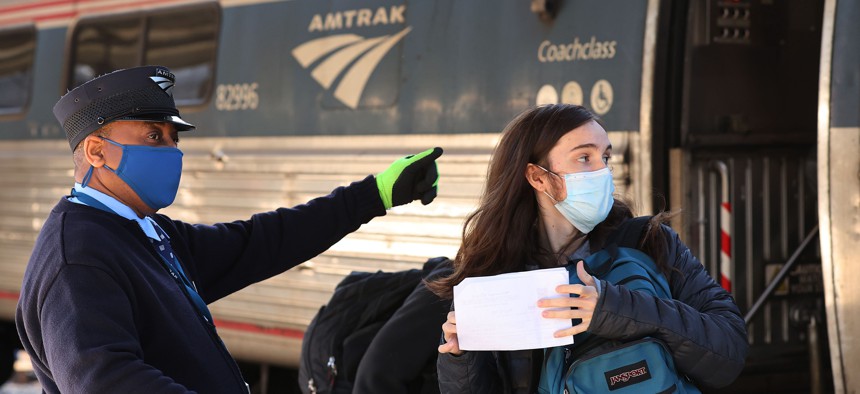Why Expanding Amtrak Service to More States Could be Tough

Chip Somodevilla/Getty Images
A federal watchdog report warns that the railroad should improve its relationship with states where it already operates before adding new service.
The Biden administration wants to greatly expand passenger rail service throughout the country, in large part by expanding its partnership with states. But the railroad is having trouble working with the states it has already partnered with, according to a new report.
One of the biggest flashpoints between Amtrak and the 17 states it works with is the level of control states have over the routes they help support, according to Amtrak’s inspector general.
State entities provided more than a quarter of Amtrak’s total revenue and the routes they subsidize made up half of Amtrak’s ridership before the pandemic.
“In return, some (states) expect more control over decisions that impact their individual routes and costs than the company believes it should provide, given operational, legal, and practical limitations,” wrote the inspector general, which interviewed state transportation officials who worked with Amtrak.
The inspector general’s office added that, if the issues it flagged go unresolved, it could hamper the railroad’s 15-year vision of expanding service to as many as 160 new communities and 16 new states.
States can determine schedules on their routes, and what amenities should be provided on those trains. But various state transportation agencies also wanted to have a say in fares, promotions, payment methods, station staffing and even the type of rail equipment Amtrak uses.
Amtrak executives, though, told the inspector general’s office that many of those requests wouldn’t be feasible. The railroad needs some uniformity to maintain a national network, so that, for example, passengers could use the same fare system to buy tickets on connecting trips. Federal law also limits the flexibility on issues such as station staffing.
Practically, tailoring services to individual states can also be cumbersome, the Amtrak executives told the inspector general. It took a year, for instance, just to get the railroad to install bike racks on the trains running in one state, because states share trains for their routes. All of the states that used the trains had to agree to pay for bike racks before they could be installed, including states that did not ask for the upgrades.
Another big sticking point between Amtrak and the state agencies has been how the railroad determines the state’s share of the bill for the routes they subsidize. Most of the state agencies said they didn’t think their costs aligned with the service they were getting. Meanwhile, states and Amtrak are still working on determining how much states should pay for new equipment and other capital expenses.
Contractor or Franchise?
The disagreements between Amtrak and its state partners can run even deeper, the inspector general noted.
Some states view the arrangement as if they are hiring a contractor to provide rail service. Under that model, states would “pay the company to provide the type of train service they want, have a high-level of control over decisions that affect their costs, and receive a high level of support from the company.”
But Amtrak executives, including its president, view the partnerships more as a franchise relationship. In that model, the inspector general explained, Amtrak “would set national standards, allow state partners some control over decisions that affect their routes, and provide support at a level commensurate with the time and resources the company can afford to commit.”
The states and Amtrak have worked through many of their ongoing disagreements using a working group that Congress created.
The inspector general, though, warned that Amtrak needed to resolve ongoing questions about the level of service it now provides in states if it wanted to further build out its network of state-supported routes.
“These persistent and conflicting perspectives with state partners will continue to hinder success on future issues” if they are not resolved soon, the inspector general wrote.
Daniel C. Vock is a senior reporter for Route Fifty based in Washington, D.C.
NEXT STORY: Fraudsters Set to Pounce on Massive Infrastructure Money






